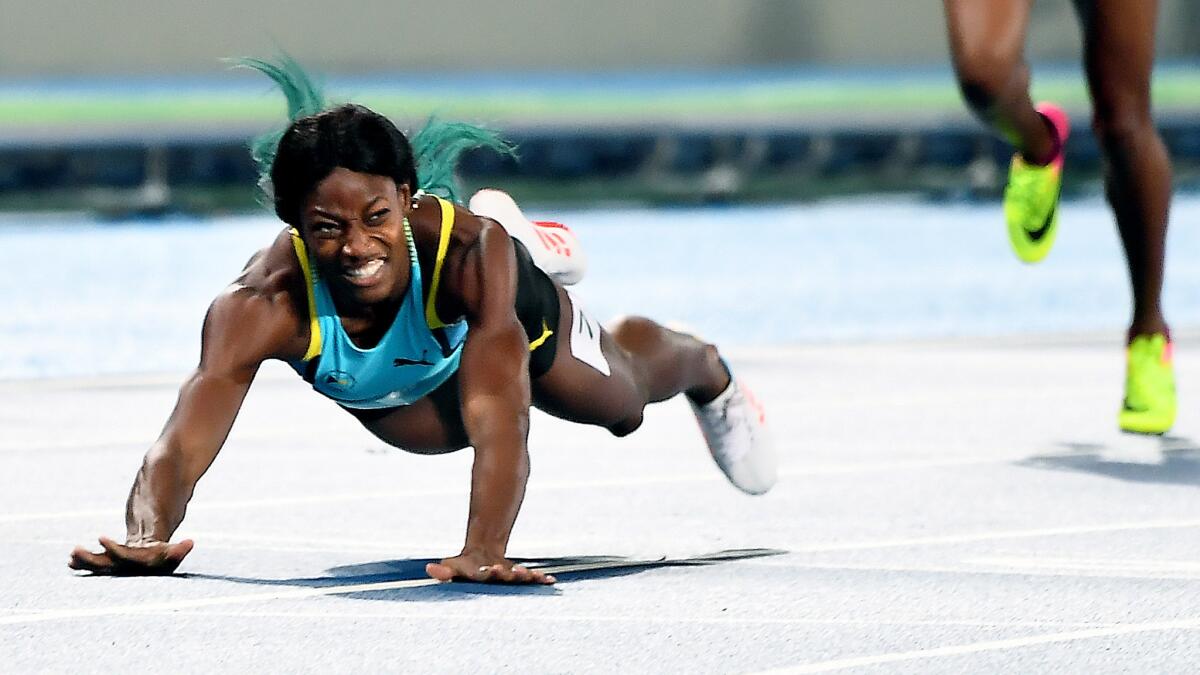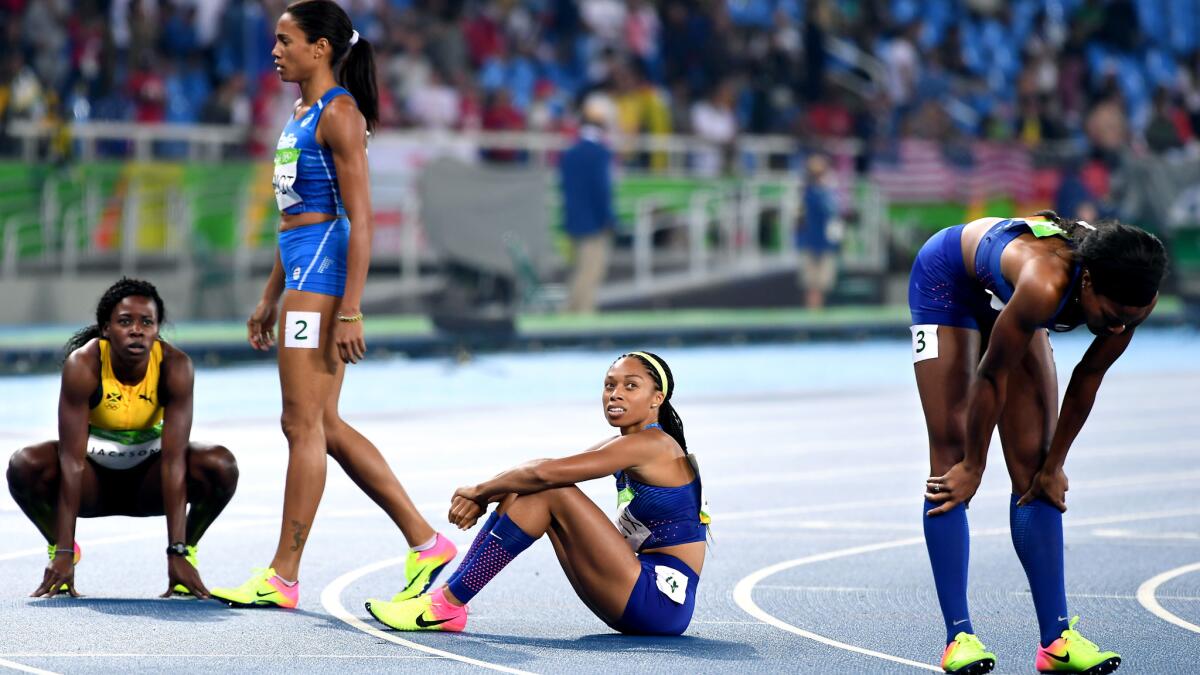Shaunae Miller’s dive is enough to beat Allyson Felix for gold in women’s 400

- Share via
Reporting from Rio de Janeiro — Could Shaunae Miller have beaten Allyson Felix in the Rio Olympic 400-meter final without diving toward the finish line and turning herself into a blur of Bahamian blue?
We’ll never know. Miller said she didn’t intentionally launch herself in the air, that her mind went blank as she neared the end of the grueling race and “the next thing I knew, I was on the ground.” She stayed there for a while, rolling onto her back after the face-first tumble that scraped her hip and leg, unsure of the result until she heard her mother’s voice through a loud but small crowd at Olympic Stadium. “I heard her scream, ‘Yeah, yeah,’” Miller said. “That’s how I found out.”
That’s when the world found out Miller had won the gold medal in 49.44 seconds, ahead of Felix’s 49.51 and the 49.85 posted by Jamaica’s Shericka Jackson. That’s also when Felix, sitting on the ground with her hands clasped around her knees, knew her vexing, injury-marred season had taken another unfortunate turn.
“It’s been a tough road,” she said, her voice breaking. “I was really hoping that it would come together tonight and it didn’t.”
Felix, a lifelong Los Angeles resident, damaged ligaments in her right ankle in a weight-room mishap in late April, which took away too much practice time for her to make the United States team in the 200 and defend her 2012 Olympic title. But she endured pain and doubt to win the 400 at the U.S. trials and preserve her chance to win an individual gold medal in Rio. Then, her lack of race sharpness and Miller’s determination took that away, too.
“I have to look back at the race,” Felix said, “but I should have been a bit more aggressive. I might have let it get away from me.”

It was no consolation that the medal was her seventh in Olympic competition, making her the most decorated female U.S. track and field athlete in history — and with two relays here in her plans. Only one of those medals is gold from an individual event, the 200 in London; she’s won three golds in relays. She won silver in the 200 in 2004 and 2008 before her runner-up finish in the rain-delayed 400 Monday.
“It’s a little bittersweet now,” she said. “I’m a competitor and I went for it, and I think at the moment it’s just painful.”
Diving at the line is legal. According to Rule 164 of the International Assn. of Athletics Federations, “the athletes shall be placed in the order in which any part of their bodies (i.e., torso, as distinguished from the head, neck, arms, legs, hands or feet) reaches the vertical plane of the nearer edge of the finish line.” Miller’s torso reached that plane first. She might not have needed to dive, but it provided drama and ignited Internet debates over whether it was sportsmanlike, no matter that it’s permitted.
Felix said she had never made a finish-line dive and was evasive when asked her opinion of Miller’s move. Miller, who competed for the University of Georgia before turning pro, said she hadn’t done it before and didn’t plan to do it Monday. “It just kind of happened,” she said. “The only thing I was thinking was, ‘I have to get the gold medal.’”
The finale overshadowed several other outstanding efforts on what turned into a soggy evening.
Notable was Kenyan David Rudisha’s second straight gold medal in the men’s 800, with a time of 1:42.15, and Ohioan Clayton Murphy’s bronze-medal effort in a personal-best 1:42.93. Thiago Braz da Silva of Brazil delighted the home crowd by winning the pole vault with a leap of 6.03 meters (19 feet 91/4 inches), ahead of 2012 gold medalist Renaud Lavillenie of France (5.98, 19-7½) and Sam Kendricks of the U.S. (5.85, 19-2¼).
In the morning session, Emma Coburn of Boulder, Colo., won bronze in the 3,000-meter steeplechase with an American-record time of 9:07.63, the first Olympic medal for an American woman in the event and the eighth-fastest time in the event’s history. Ruth Jebet, a Kenya native who runs for Bahrain, won in 8:59.75, with Hyvin Kiyeng Jepkemoi of Kenya second (9:07.12). “I just kept on telling myself to keep on chipping away at the gap and once I got my position, all I wanted was to hold it,” Coburn said. “It wasn’t until the last 400 or 600 meters when I realized that I had it and just couldn’t lose it.”
Dalilah Muhammad, a four-time all-American at USC, made it to the semifinals of the women’s 400-meter hurdles. So did Ashley Spencer and New Jersey high schooler Sydney McLaughlin, 17. All three American men advanced in the 110-meter hurdles, which was interrupted by rain.
Discus thrower Whitney Ashley of Moreno Valley fouled on her three attempts and didn’t advance. There was no warmup for her group after the event was delayed by rain. “I couldn’t feel where the disc was,” she said.
Felix didn’t disguise the disappointment she felt. “I don’t think I’ve had a year this tough,” she said, her voice breaking again. “I just really wanted it.”
Twitter: @helenenothelen
ALSO
Simone Biles and Aimee Boorman formed a partnership that goes well beyond gymnastics
Ryan Lochte recalls a gun to his head after another troubled day at Rio Olympics
More to Read
Go beyond the scoreboard
Get the latest on L.A.'s teams in the daily Sports Report newsletter.
You may occasionally receive promotional content from the Los Angeles Times.





